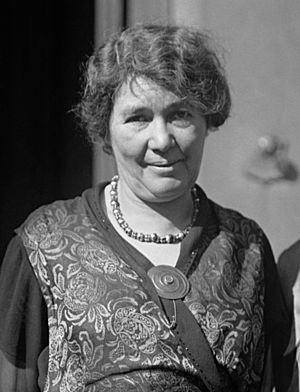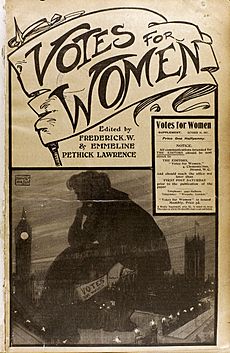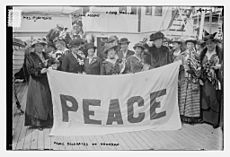Emmeline Pethick-Lawrence facts for kids
Quick facts for kids
The Lady Pethick-Lawrence
|
|
|---|---|

Pethick-Lawrence, c. 1910s
|
|
| Born |
Emmeline Pethick
21 October 1867 Clifton, Bristol, England
|
| Died | 11 March 1954 (aged 86) Gomshall, Surrey, England
|
| Nationality | British |
| Known for | Campaign for women's suffrage, co-founder of Votes for Women. |
| Political party | Women's Social and Political Union, United Suffragists |
| Spouse(s) | Frederick Pethick-Lawrence, 1st Baron Pethick-Lawrence |
Emmeline Pethick-Lawrence (born Emmeline Pethick; 21 October 1867 – 11 March 1954) was an important British activist. She fought for women's rights and was a leading suffragette. Suffragettes were women who worked hard to get women the right to vote.
Contents
Emmeline's Early Life
Emmeline Pethick-Lawrence was born in Bristol, England. Her father, Henry Pethick, was a businessman. He owned a newspaper called the Weston Gazette. Emmeline was one of 13 children. When she was eight years old, she was sent to a boarding school. Her younger sister, Dorothy Pethick, also became a suffragette.
Career and Marriage
From 1891 to 1895, Emmeline worked to help people in need in London. She helped run a club for girls. In 1895, she and her friend Mary Neal started the Espérance Club. This club was a safe and fun place for young women and girls. They could try out dancing and drama there.
Emmeline also created Maison Espérance. This was a special clothing-making business. It made sure workers earned a fair wage and worked only eight hours a day. They also got holidays.
In 1901, Emmeline married Frederick Lawrence. They both changed their last name to Pethick-Lawrence. They even kept their money in separate bank accounts. This showed they believed in being independent.
Fighting for Women's Right to Vote
Emmeline Pethick-Lawrence joined the Suffrage Society. In 1906, she met Emmeline Pankhurst, who had started the Women's Social and Political Union (WSPU) in 1903. This group was dedicated to getting women the right to vote.
Emmeline Pethick-Lawrence became the treasurer of the WSPU. She helped raise a lot of money for the cause. She attended many events with Emmeline Pankhurst. Sometimes, these events led to protests.
In 1907, Emmeline and her husband started a newspaper called Votes for Women. This newspaper helped spread their message.
In 1912, the Pethick-Lawrences were arrested. This happened after some protests where windows were broken. Even though they didn't agree with breaking windows, they were still charged.
After they were released from prison, Emmeline Pankhurst and her daughter Christabel asked the Pethick-Lawrences to leave the WSPU. This was because they disagreed about how extreme the protests should be. Emmeline Pethick-Lawrence's sister, Dorothy, also left the WSPU because of this.
The Pethick-Lawrences then joined a new group called the United Suffragists. This group welcomed both women and men, and people who preferred peaceful protests or more active ones. They also took over publishing the Votes for Women newspaper.
Later Life and Recognition
In 1938, Emmeline Pethick-Lawrence wrote her life story. It talked about how the movement for women's voting rights became more active before World War I. She also helped create the Suffragette Fellowship. This group worked to record the history of the suffragette movement.
In 1945, her husband became a baron. This meant Emmeline became known as Lady Pethick-Lawrence.
Emmeline Pethick-Lawrence is remembered for her work. In 2018, her name and picture were placed on the base of a statue in London. The statue honors Millicent Fawcett, another important women's rights leader.
In March 2020, a special blue plaque was put up in her honor in Weston-super-Mare. It marks a house where she lived as a child.
Organisations Emmeline Supported
- Espérance Club
- Guild of the Poor Brave Things
- Independent Labour Party
- Kibbo Kift
- West London Methodist Mission
- Women's International League
- Women's Social and Political Union (WSPU)
See also
 In Spanish: Emmeline Pethick-Lawrence para niños
In Spanish: Emmeline Pethick-Lawrence para niños
 | Bessie Coleman |
 | Spann Watson |
 | Jill E. Brown |
 | Sherman W. White |



